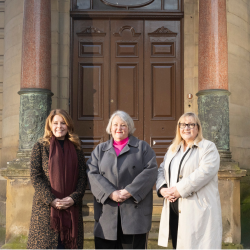-
Study
-
Undergraduate
- Search for a Course
- Undergraduate Open Day & Events
- Application Guides
- Northumbria University UCAS Exhibitions
- Foundation Years
- Undergraduate Fees & Funding
- School & College Outreach
- Continuing Professional Development
-
Postgraduate
- Postgraduate Study Degree
- Postgraduate Research Degrees
- Postgraduate Open Days and Events
- Postgraduate Fees & Funding
- Flexible Learning
- Thinking about a Masters?
- Continuing Professional Development
- Change Direction
-
Student Life
- The Hub - Student Blog
- Accommodation
- Life in Newcastle
- Support for Students
- Careers
- Information for Parents
- Students' Union
- Northumbria Sport
- Be Part of It
-
-
International
International
Northumbria’s global footprint touches every continent across the world, through our global partnerships across 17 institutions in 10 countries, to our 277,000 strong alumni community and 150 recruitment partners – we prepare our students for the challenges of tomorrow. Discover more about how to join Northumbria’s global family or our partnerships.
View our Global Footprint-
Applying to Northumbria
- European Union
- Our London Campus
- Northumbria Pathway
- International Events
- Entry Requirement and Education Country Agents
- Global Offices
-
Northumbria Language Centre
- Faculty Requirements
- Acceptable English Requirements
- Pre-sessional English Language and Study Skills
- Academic Language Skills Programmes (ALS)
-
International Fees, Funding & Scholarships
- International Undergraduate Fees
- International Undergraduate Funding
- International Masters Fees
- International Masters Funding
- International Postgraduate Research Fees
- International Postgraduate Research Funding
- International Money Matters
-
Life at Northumbria
- International student support
- Careers
-
International Mobility
- Current Northumbria Students
- Incoming Exchange Students
-
-
Business
Business
The world is changing faster than ever before. The future is there to be won by organisations who find ways to turn today's possibilities into tomorrows competitive edge. In a connected world, collaboration can be the key to success.
More on our Business Services -
Research
Research
Northumbria is a research-rich, business-focused, professional university with a global reputation for academic quality. We conduct ground-breaking research that is responsive to the science & technology, health & well being, economic and social and arts & cultural needs for the communities
Discover more about our Research -
About Us
-
About Northumbria
- Our Strategy
- Our Staff
- Place and Partnerships
- Student Profiles
- Alumni Profiles
- Leadership & Governance
- Academic Departments
- University Services
- History of Northumbria
- Contact us
- Online Shop
-
-
Alumni
Alumni
Northumbria University is renowned for the calibre of its business-ready graduates. Our alumni network has over 246,000 graduates based in 178 countries worldwide in a range of sectors, our alumni are making a real impact on the world.
Our Alumni - Work For Us
What will I learn on this module?
This module offers you a thematic survey of Britain in the transformative period since 1689. The module is intended to provide you with a conceptual treatment of the development of British society to complement other modules. By examining 11 key British historical figures it provides students with a broad overview from the Glorious Revolution to current debates on immigration and national identity, drawing attention to key themes and debates. It encourages the development of the historian’s skills of analysis. Among the key themes covered are: national identity and the making of a nation; the transformation of the system of production; the transformation of patterns of reproduction (including population and occupational change); transformations in systems of governance, power, protest and social policy; the transformation of popular culture and ritual; empire, immigration and the Britishness debate; and war, political and social change in the twentieth century. Throughout the module you will be exposed to the tensions and contests that existed between different views of Britain and Britishness: for instance between frontiers and centres; between ‘enlightened’ and popular cultures; and between the politics of parliament and the politics of the street.
How will I learn on this module?
Each week you will attend a one hour, thirty minute lecture slot and 1 one hour, thirty minute seminar. The lecture slot will be broken by a short break, and that two broad lecture themes will be addressed in each slot. The lectures will introduce you to key periods, events, themes and issues; they will also expose you to some of the historical debates and controversies that surround particular eras and historical problems. Lectures provide core information and ideas to students and key themes developed in these settings will be explored in seminars.
You will be expected to prepare for the weekly seminars by attending the lectures and undertaking essential and recommended reading. You will also build on your independent reading by presenting your ideas and responses to lecture and reading materials in seminar discussions with your peers. All learning materials, tasks and readings will be posted on the eLearning Portal (Blackboard) to enable participation within the seminar programme. You will participate in formative assessment activities and receive feedback, and will be responsible for your own guided and independent learning. Summative assessment – an exam and an essay – tests your knowledge of British history, and assesses the extent to which you have met the module’s learning outcomes.
How will I be supported academically on this module?
Your academic development will be supported through engagement with your peers, academic tutors, and the module convenor. The tutor will be accessible within publicised feedback and consultation hours and via email. Your peers will provide you with a collaborative learning environment, and your module tutor will guide you through the requirements and expectations of your course. Your seminar tutor will work with you and your peers to make sense of the module material in the seminar. You will also be supported through individual engagement with the academic literature, lectures, and resources available on the eLearning portal. Formative feedback will be on-going throughout the module: tutors will respond in class to how you are interpreting texts, framing arguments, and developing opinions.
What will I be expected to read on this module?
All modules at Northumbria include a range of reading materials that students are expected to engage with. Online reading lists (provided after enrolment) give you access to your reading material for your modules. The Library works in partnership with your module tutors to ensure you have access to the material that you need.
What will I be expected to achieve?
Knowledge & Understanding:
1. Demonstrate knowledge of key themes in the development of Britain in the period 1689-2000.
2. Exhibit an understanding of key concepts and issues in social, economic and political transformation, such as: industrial revolution, uneven development, class, liberalism, socialism, national identities, revolution, immigration, modernism, empire, and consumerism.
Intellectual / Professional skills & abilities:
3. Identify and deploy a variety of important historical writing in the study of British history.
4. Exhibit an ability to select relevant material across period and place and deploy this evidence in written form.
Personal Values Attributes (Global / Cultural awareness, Ethics, Curiosity) (PVA):
5. Develop enquiry skills by presenting ideas and knowledge in seminar discussions with others.
How will I be assessed?
The assessment takes the form of one 2,000-word essay (50%) and a two-hour exam (50%). MLOs 1-5
The essay questions are based on the lecture topics from the first half of the module. The exam questions are based on lecture topics in the second half.
Formative assessment is undertaken by way of seminar discussions and essay tutorials where students develop subject knowledge, the understanding of historiographical debate, and the enhanced use and understanding of conceptual and critical analysis.
Pre-requisite(s)
None
Co-requisite(s)
None
Module abstract
Please find details of this module in the other sections provided.
Course info
UCAS Code V100
Credits 20
Level of Study Undergraduate
Mode of Study 3 years Full Time or 4 years with a placement (sandwich)/study abroad
Department Humanities
Location City Campus, Northumbria University
City Newcastle
Start September 2025
All information is accurate at the time of sharing.
Full time Courses are primarily delivered via on-campus face to face learning but could include elements of online learning. Most courses run as planned and as promoted on our website and via our marketing materials, but if there are any substantial changes (as determined by the Competition and Markets Authority) to a course or there is the potential that course may be withdrawn, we will notify all affected applicants as soon as possible with advice and guidance regarding their options. It is also important to be aware that optional modules listed on course pages may be subject to change depending on uptake numbers each year.
Contact time is subject to increase or decrease in line with possible restrictions imposed by the government or the University in the interest of maintaining the health and safety and wellbeing of students, staff, and visitors if this is deemed necessary in future.
Useful Links
Find out about our distinctive approach at
www.northumbria.ac.uk/exp
Admissions Terms and Conditions
northumbria.ac.uk/terms
Fees and Funding
northumbria.ac.uk/fees
Admissions Policy
northumbria.ac.uk/adpolicy
Admissions Complaints Policy
northumbria.ac.uk/complaints














